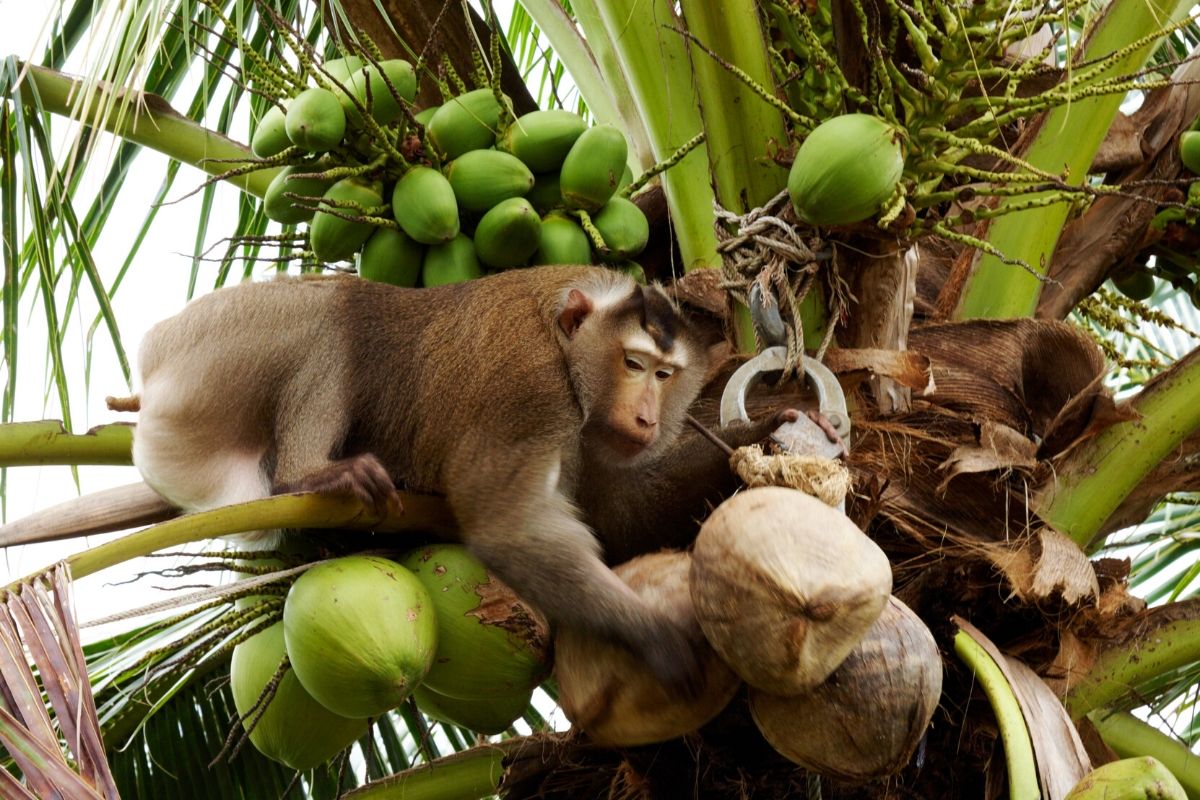Are Monkeys Used To Pick Coconuts? Just when you thought you had your ethical lifestyle down to a tee, along comes another source of anxiety and debate: monkeys picking coconuts. Recent media reports claim that in Thailand, pigtailed macaques are being taken from the wild. Made to pick around 1,000 coconuts a day, they are mistreated by farmers who want a piece of the global coconut market. But is there any truth to the claims of abuse and forced labour? Is it just sensationalist reporting? Did a monkey really pick your coconuts??  AN ANCIENT PRACTISE AND A MODERN DILEMMA AN ANCIENT PRACTISE AND A MODERN DILEMMA
Training monkeys to pick coconuts is a 400-year-old practise in Thailand; there's even a Buddhist school for that very purpose, which promotes training without force or violence. The practise is common in places such as India, Malaysia and Sri Lanka too. You see, monkeys are super-pickers, naturally at home in the tall coconut trees. Males can harvest over 1,000 coconuts a day; females around 600. Humans, on the other hand, are super-slow and clumsy in the treetops, with a mere 80 coconuts a day to their name. Since coconut oil, water, milk, and flesh are big business, it's only natural farmers would use the most cost-effective and productive harvesting methods. WHAT DO CAMPAIGNERS THINK ABOUT MONKEYS PICKING COCONUTS? After PETA, Animal Place and Boris Johnson's fiancée, Carrie Symonds, spoke out about the issue, several British retailers vowed to ban Thai coconut products from their stores. Interestingly, Thailand's commerce minister recently claimed the practice of using monkeys "is almost non-existent" and has long since been replaced by human labour. ANIMALS HAVE ALWAYS WORKED, SO WHAT'S THE PROBLEM? It could be argued that monkeys are being exploited to meet growing consumer demand for coconut products. It's easy to take the "selfish humans only thinking of monetary gain" stance when we're presented with sensationalist reports. But throughout history, humans have used animal labour to increase productivity or make tasks more manageable. From horses pulling ploughs in the English countryside; donkeys carrying luggage on South American treks; drug-sniffer dogs in the US to guide dogs literally everywhere - all of those animals were specifically raised and trained to do their "jobs". Perhaps what upsets people about monkeys picking coconuts is that monkeys are so much like us. We share 93% of our DNA with macaques. We identify with many of their behavioural traits. So when we read about them being "abused" or "exploited", we perhaps feel more strongly about the issue than we do about, say, parrots riding bicycles to entertain tourists in Spain. IS IT POSSIBLE THE MONKEYS ENJOY PICKING COCONUTS? According to leading animal welfare organisations, macaques are snatched from the wild as babies and chained up or stuck in cramped cages, which makes them extremely stressed. They're forced to pick coconuts for human gain and denied companionship, mental stimulation and basic freedom. However, it's important to note there is no concrete evidence of "baby-snatching" or mistreatment. It could even be argued that the process of training is mentally stimulating, which, being intelligent animals, the macaques would enjoy. Furthermore, coconut farmers insist the monkeys aren't abused or exploited. They say the monkeys are treated like family pets; loved and cared for, fed and watered, bathed and groomed. The tethering, they say, is for the monkeys' safety while climbing coconut trees. I LOVE COCONUTS AND MONKEYS! WHAT CAN/SHOULD I DO? Seek out the facts. All parties - the farmers, the Thai government and the animal rights groups - have their own agendas. (It is also interesting that many of these groups don't allow comments on their articles to allow for reasonable debate- Ed.) If you want to live an ethical lifestyle, you must do your own research before banning certain products. As you may know, refusing to purchase one product on ethical or moral grounds can have a knock-on effect on other areas. For example, banning plastic and using paper instead can lead to more trees being cut down. Ethical living can be a minefield in the modern age. But if we stick to the facts and live true to our individual values, we can't go wrong. Below is a comment from Arjen Shroevers from The First Monkey School that I highly recommend you read for more insight on this subject. ET VOUS? Where you aware that Monkeys pick coconuts? We would love to hear your thoughts so please leave your comments below. And not to sound too abusing, would you please share this article? It would really help us and it would instantly make you our favourite reader! READ: The Best Uses and Benefits of Coconut Oil for Your Health and Beauty | 

 AN ANCIENT PRACTISE AND A MODERN DILEMMA
AN ANCIENT PRACTISE AND A MODERN DILEMMA





The person who wrote this article must be getting paid by the company s who use the baboons to make it sound practically cruelty free as we know with all practice s using animal s there is always cruelty involved people are not interested in the animals welfare only the profit they can make from them
Thank you for your comment, Catherine, although there are a couple of things you should know.
Firstly, we wrote the article, and we are certainly not being paid by anyone for it. Secondly, no one mentioned baboons :)
There isn't ALWAYS cruelty involved.
As mentioned in the article above, humans have always used animals. For centuries, humans bred dogs specifically to help with many practical tasks: from hunting and herding to fishing and farming. Horses are still used for transport, working agricultural land, forestry work and even for the pleasure of humans to ride. We also force them to dance in the Olympics.
In this world of social media and disturbing youtube videos, too many people jump to a conclusion without really knowing the facts. Look at Animal Place, for example. They created a frenzy on this issue and yet admit they haven't seen the cruelty first hand in Thailand, just videos on youtube.
Sure the sick individuals who abuse animals should be sought out and held accountable, but that doesn't mean everyone treats animals that way. Most of us take care of animals - and yes, I put my dog on a leash :)
That's the problem, other animals being used for our gain. It has nothing to do with them being primates and looking like us. Peta has often spoken about these issues with all non human animals. So I don't get your non-sequitur.
This is not about primates looking like us, it is about humans treating animals with respect, which most of us do. Perhaps you should read the article again.
Peta is of no interest to me - they would have me stop throwing a stick for my dog to fetch because it is cruel and abusive, whereas my dog seems to have a lot of fun.
who cares what PETA has often spoken about? they are radicals, and they are highly political and do not have credibility with actual animal experts. A human gaining something via a relationship with an animal(s) is not intrinsically wrong or exploitative. If you have a human friend who loves to climb trees, and has no trees in his yard to climb, and you have coconut trees in your yard, and no way to harvest the coconuts, is it exploiting your friend to let him climb the coconut trees, and retrieve the coconuts? things are not always zero sum. that's an immature and foolish way to look at the world, really. there are plenty of situations in which animals choose to capitalize from a relationship with humans, and vice versa. Sure, there are exploitative relationships too, and abusive ones, as well. I am not denying that, but to view any situation where humans benefit from an animal's actions or behaviour (in captivity or in the wild) as somehow unethical, is illogical.
Thank you for your comments, Jonathan - a voice of reason :)
"Baboons" - are we sure this commenting application can detect robots?
And all those farm working dogs, they are most definitely abused (typically being so well fed, loved, and cared for by their owners)
I really appreciate your article and am very happy to see that there are others that have the same thoughts and feelings as I do about this issue. I started to think "what's so wrong with horse labor on a farm?" and realized that PETA probably has an argument as to why using horses on a farm is bad. I also appreciate that you mentioned how they don't allow for comments on their articles. Lots of proof that they are a crooked organization.
I am looking forward to my Thai meal that I'm planning with my company for next week! (a review of the restaurant I'm ordering from mentioned them using Thai coconut milk that uses "abusive monkey labor" so they were so disappointed in the entire meal afterwards)
Abused monkeys used for coconut picking.
Surat-Thani, 06-07-2020
I hope you will take a moment to read the following story. A lot of wrong information is distributed, whether or not deliberately.
My name is Arjen Schroevers, I was born in Amsterdam in 1965. I have lived in Thailand for almost twenty years now, and am married to Somjai Saekhow. Somjai Saekhow is one of the two daughters of Somporn Saekhow, one of the most famous monkey trainers in Thailand. One of his monkeys is so well known (Kai Nui) that when Thai speak of monkeys in general they often use the name "Kai Nui". So just like many people call an "adjustable wrench" an "Bahco".
When my father-in-law started training, he knew little about monkeys. He did find that many other trainers trained the monkeys with too much force. He has developed a training method (in 1955 !!) that works completely without penalties. If the monkey does something wrong, the wrong behaviour is ignored. That is sometimes difficult because a mistake is often funny, but laughing is also a reward. If the monkey does something right, the good will be rewarded until the trainer becomes almost nauseous from himself. Almost never the reward is food, but mostly friendly words, hugs, "fleaing". My father-in-law's daughter, my wife, continued the school after Somporn died. I occasionally talk about “we”, but I don't run the school, I don't own it, and I don't work there. I only live there.
We do a lot of information. The relationship between Thai and animals is often quite difficult. We are open to visitors. People can see with us how a monkey is trained and what steps a monkey must go through to become an accomplished coconut picker. We give a demonstration, not a show !! With us you don't see monkeys cycling, playing guitar or dancing. And they don't even wear funny clothes. Most of our visitors are Thai. Our school is known as the best and most animal-friendly training institute in Thailand. We are therefore not a "monkey school" but we are the "Monkey Training College". We request access fees from visitors, however Thai schools can visit us free of charge. My father-in-law already did, and we will continue to do so, because it is important information.
Now briefly about PETA. PETA is a militant vegan organization. Especially in their early days they used violence quite regularly to achieve their goal. Their goal is to stop all interaction between humans and animals. You read it correctly ALL. PETA sees human possession of animals as animal cruelty. So yes, your cat, your dog, your fish tank with fish, your rabbit in his cage, and even the bird that you raised as a fallen youngster has to go back to nature. That bird does not want to be with you…. And of course they are strongly against keeping animals commercially.
However, PETA has developed extremely well. They have a beautiful website, very good PR. They can hardly be caught in violence anymore. They no longer challenge things that the general public might find "nonsense". But they search continuously. And they are overjoyed when they find things that can get the general public moving. PETA doesn't mind at all when they find abused animals. As long as they can share that with the general public it makes them very happy.
Almost the entire original PETA article is nonsense. (https://secure.petaasia.com/page/63752/action/1)
• Different types of coconuts and their trees:
There are about 80 types of coconuts. In Thailand there are two very well-known ones. The tall tree, maximum 30 meters. This tree produces the brown, ripe coconuts. These coconuts are used to make coconut flour, sugar, grated coconut, coconut milk and coconut oil. There is also a low variety, maximum 5 meters. This tree produces the young coconuts from which the water is extracted for drinking. These trees are low, so they are picked by people. Since these nuts are not yet ripe, they are very difficult to pick. They are picked by removing the complete flower. They are therefore traded per cluster of between 8 and 12 pieces. A monkey can never do that.
• The monkeys come out of the wild illegally:
If the monkeys come out of the wild, they are indeed illegal. It has been forbidden, and monitored, to take monkeys out of the wild for years. Monkeys must be bred, they must have a chip, and the parents must be known and have a chip. It will still happen, but riding without a helmet is also prohibited in Thailand, and that still happens a lot. What is a much worse nonsense story is that the mother monkey is shot to take the pathetic cub away from her. This is such a nonsense story. A baby monkey hangs almost continuously on the mother's belly. Hunters almost always shoot with hail. So you have to have a hunter who is a sniper and not use a shotgun. This hunter then faces the difficult task of killing the mother and keeping the young intact. Okay, imagine that it works. The dead mother, and her cub, is guarded by the rest of the group. If you want to take the cub away, you risk colliding with at least sixty other monkeys. Then you should shoot them all. Does anyone really believe it goes like this?
• Canines (tusks) are pulled out:
Only male monkeys have tusks. A monkey also naturally picks coconuts. If they have had no training, they only use their teeth. That is not good for the teeth. So the trainer teaches the monkey other ways to pick the coconut. But with difficult coconuts, the monkey still uses its teeth. They also use them to untangle a rope. When an owner really removes those teeth, it is not a smart owner.
• Monkeys are transported in tight cages:
Of course. That is the safest and easiest way to transport a monkey. A horse is transported in a (tight) horse trailer, and a dog in a tight bench. Much easier and especially SAFE.
• Monkeys are chained and forced to climb up and down to pick as many as 1,000 coconuts a day.
Yes, the monkeys are on a leash. Only the first 20-30 cm is a thin chain, this to simplify changing to different line lengths. The rest is a thin, flexible rope. That rope is mainly to guide them. The leash is used just like a rider using the reins to control his horse. The monkey does not have to be forced to climb up, it does it all by itself. And of course the monkey also climbs down by itself. A female monkey can pick about 600 coconuts per day. A male monkey as much as 1,600. To achieve these numbers, the following conditions must apply: the monkey must be well trained, in good condition, there must not be picked for a long time, so that the trees bear a lot of fruit and the trees must be close together so that the monkey can jump from tree to tree.
• The sentence: "According to an insider most coconuts from thailand are collected by monkeys" is a misquoted statement by me.
I have said something in the trend of: “in the south of Thailand (the trees are the highest there), more coconuts are picked by monkeys than by humans.
• Collecting by humans is superior to collecting by monkeys
We get many requests from coconut producing countries if we want to export trained monkeys to them, as everyone knows a monkey is much more efficient and faster and safer as a human is.
• Monkeys cannot distinguish difference between ripe and unripe fruits.
Absolute not truth. Monkeys are much better in this than their human counterparts. Humans only select on color, but green coconuts can be ripe too. A monkey will collect all ripe coconuts, independent from the color. And the monkey leaves the unripe coconuts in the tree. And the most funny thing, it is the most simple thing to teach them..
• The ripe coconuts gets bruised when the monkeys drop them on the ground.
I never heard more nonsense. Also when people collect coconuts they drop from the same height. Even when an overripe coconut drops on a concrete slab you will not find any damage on the coconut. They are designed to survive these falls!!
About three years ago we suddenly received a lot of hate emails, most of them came from America, and a large number of them I could trace back to people who are also active within PETA.
The monkeys we have are clearly happy when they are chosen to be trained. They like the attention, and they enjoy working. There is absolutely no violence or coercion involved. The many monkey owners we know all work very quietly with their monkeys. No shouting, no hitting. However, if a stranger comes close, especially if this large film or photo equipment is with them, the monkeys show very anxious behaviour. It takes them a day to get used to the new person. So it is very easy to take pictures of frightened monkeys.
Animal cruelty is also prohibited in Thailand. PETA is of course happy that they found this. They just have a lucky catch. But if they had been really good they would have gone to the police or to the “Office for Agricultural Affairs” PETA even writes on their website that they ask people to report animal abuse to the local police. But PETA themselves prefer to contact the media, instead of helping the poor monkeys they say they have found.
What are alternatives to monkey picking coconuts? Worldwide, coconuts kill 600 people a year. Most of the deaths are people who work in the plantations. In many areas Thailand is the world leader, road deaths, drug deaths, suicides, firearms deaths, electrocutions and lightning strikes are the best known. However, killing by coconuts is very low in Thailand. This is due to the use of monkeys. PETA also offers alternatives. Low stem trees are not an alternative if you do not want to use enormous amounts of pesticides. The mechanical alternatives are very laughable. It takes half an hour before a device (be it an aerial work platform, a crane or a climbing device) is up in the tree. Often they can then reach a quarter of the tree. If they are lucky a third. That means up and down at least three times. Then manoeuvre on the ground again.
In Thailand, two alternatives are used for monkey picking. The first method is someone who climbs a tree, up to 20 meters seems to be doable. The last ten meters become very difficult. It doesn't take much fantasy to figure out what happens when someone (even halfway through) falls from the tree.
The second method is with a long stick with a knife attached. Here too, it is still possible with trees up to 20 meters, but with trees up to 30 meters this is almost impossible. No one is strong enough to operate the stick at an angle. The picker is therefore next to the tree, with the stick parallel to the trunk. He is right under the coconuts that are going to fall. He is holding the stick with two hands. A coconut on your head from a height of 20 meters is always deadly. (oh, and the cause of death is a broken neck, so a crash helmet doesn't help). Your skull cap is located roughly between your shoulder blades. The meter 10 is more "to be sure" to kill you. According S =1/2at2 takes the fall as the tree 20 meters high is, 2 seconds (20 =1/2.10.22)The speed is then V = at = 10.2 = 20m/s = 72km/h
I must also say, a small part of this fuss has also been caused by the Thai government. There are regulations about keeping animals, but there is hardly any enforcement. We are checked four times a year. That is very often. When asked why, the answer was: "because we know that everything is good here ... .." A kind of panic football is now being played. The day before yesterday, the Thai government toyed with the idea to issue a press release that monkeys are not used at all. That is of course not so smart. Now they have invited foreign ambassadors to view the picking. That is a smarter move, I just wonder if ambassadors have time for this and feel like it.
We will not be bothered by a total boycott of coconut products from abroad. Our customers are small farmers who mainly produce for the local market. Maybe tourism will decrease. But what has mainly moved me to this writing is that almost every argument put forward by PETA is invalid. And yes everyone who mistreats his monkey must be addressed and arrested. In the western countries it also regularly happens that a dairy farmer neglects his cows. He is then arrested, punished and the cows are taken in elsewhere. Is there anyone who thinks that all dairy products from that country should be boycotted?
Thank you for taking the time to read this.
firstschoolformonkeys.com
Wow, thank you so much, Arjen. You have taken a lot of time and effort to give us all an inside look at this industry.
I completely agree with you that organisations such as PETA, Greenpeace, e.t.c. are more interested in sensationalism than addressing the problems of the world. It's easy to highlight the issues of the world without offering anything in the way of a viable solution.
Most problems in this world can be solved with information and education - not just forcing one side of a story down people's throats.
You have given us an eloquent and compelling explanation that we rarely hear, and I'm sure most people will be thankful for it. You have mentioned the pros and cons of monkeys picking coconuts and also the alternatives. Hopefully, you have reassured our readers that although there are bad practises out there, most of us try to do the right thing.
Thank you so much for sharing :)
Monkey's do not eat coconuts in the wild. The coconut has a husk area outside the shell of the coconut. This region is filled with coir and a metal tool has to be used to remove this region to expose the nut of the coconut. Monkey's do not posses metal tools and it is way too much work to try and use a stone to try an get the husk out. Once all the husk has been removed, then you get to the nut. The nut can be broken by repeatedly hitting the coconut shell to a rock. This will break the shell and you will finally get to the pulp and the water. The hardest part for the monkey would be to get from the husk to the nut. A monkey can steal a coconut shell from a vendor or shop and get to the pulp but the way vendors sell coconuts are not how they grow on the trees. In fact whole coconuts (direct from the trees) are rarely sold in the market. You have to be quite skilled with a sharp knife to slice the coconut to drink a young coconut's water.
After I read this I went online and found several videos of monkeys dehusking, then cracking open and eating coconuts. Your logic seems to be that it’s hard for people so monkeys can’t do it, but they evolved in areas with coconuts and their teeth, hands and brains are clearly up to the task.
Monkeys have no problems at all to open coconuts. They do this even quite fast.
Quite a clear and concise article. Yeah, there is two sides of a story, always!
You just have to love the microcosm of society this article has produced in the comments. One ignorant person who has likely never even seen a monkey or eaten a coconut, then the highly knowledgeable person speaking from a place of expertise and experience.
I'm here to fulfil my role of commenting on something in order to highlight a perceived problem in our society.
Anyway, fantastic article guys!
Thank you, Adam. There is a lot of 'believable' misinformation out there. Like you, we are just trying to level the field. Most of the problems in the world, if not all, are caused by us humans, not monkeys or plastic or palm oil. They are all just by-products of our misuse of the planet. Now if you don't mind, I have to go and put on something green :)
I just reposted Arjen's comment at the PETA's youtube video. I hope he and you would not mind.
I certainly don't mind. I can't speak for Arjen, but I'm sure it isn't a problem for him either.
It's a shame that an organisation the size of PETA don't feel compelled to tell both sides of a story.
It's also telling that they don't seem to allow anyone to leave comments on their articles :)
Thanks for posting my article. I did not know it was published somewhere. No problem to share it!
Thanks!
Arjen.
No problem, Arjen. It's nice to get an 'insiders' view as opposed to sensationalist youtube videos :)
No problem, Arjen. It's nice to get an 'insiders' view as opposed to sensationalist youtube videos :)
So in other words, (Arjen Schroevers,) the working monkeys are much like police dogs or dogs used for disabilities?
I placed this same article on our own website, www.firstschoolformonkeys.com
Here the direct link: https://www.firstschoolformonkeys.com/abused-monkeys/
Kind regards, Arjen
Thanks, Arjen :)
Quite a clear and concise article. Yeah, there is two sides of a story, always!
What a selfish moron who wrote this article!
In 2021 animals shouldn't be anyone's cheap labour!!! There are machines that pick coconuts and are more efficient than monkeys! But even if there weren't any, monkeys are chained, they're basically slaves. Their teeth removed, and you say they're treated like family pets??? Maybe Thai people have a different idea of family pets! It's crazy to justify this horrible, unnecessary practice! Jump on the tree with a metal shit around your neck and pick coconuts all day long yourself, you idiot. The elephants that are beaten to carry tourists on their backs every day are also family pets? You people are so retarded... Start living in the 21st century finally!
Bonjour Justyna,
Thank you very much for the eloquence of your comments. I understand that you have a conviction on this subject, however, quoting that all the monkeys have their teeth removed shows me that you have made very little effort to educate yourself on these matters.
Calling those that have, 'idiots', 'morons' and 'retarded' suggests you have some issues of your own to deal with, before advising others.
Perhaps I can suggest researching a little for yourself instead of regurgitating the one-sided drivel from PETA, (who incidentally, don't allow comments on their blog posts - go figure).
I assume you don't have any pets? I have a dog and when I throw a stick and ask him to bring it back, he immediately calls his solicitor crying 'exploitation!' Such is the world in the 21st Century, eh?
Oh, and for your information, I have never beaten my elephants!
Funny that you title this article with "Myths and Truths" when you obviously don't know what you're talking about. Sounds about right when you can't come up with content so you rely on entirely incorrect research to create obscure clickbait. I can't believe someone would write and publish this!! If you don't have a strong understand of a subject why witte about it to inform others?? Genuinely so lost with the purpose of this other than "we've always performed animal cruelty so it's crazy to think that anything should or would change now." Genuine stupidity!!
Thank you, Jacob, for your, well... name-calling. It seems that anyone who doesn't agree with an article just reverts to calling the writer an idiot, without providing any further information. No one suggests that animal cruelty is ok and that it shouldn't change. Can I suggest that you read the article before commenting the next time?
I clicked the link and enjoyed reading about the First Monkey School and all that is being done there with regard to monkey (and dog!) welfare. I do suspect that the monkeys very much enjoy the mental stimulation and challenge that comes with training and of course, they must love the treats and grooming.
I always recommend that if animal-welfare activists object to animals being used for work, that the activists volunteer to do the work in their stead. But.. I am sure the activists would do a poor job and just complain all the time, because in my experience, such people are only good at being miserable. They hate everything.